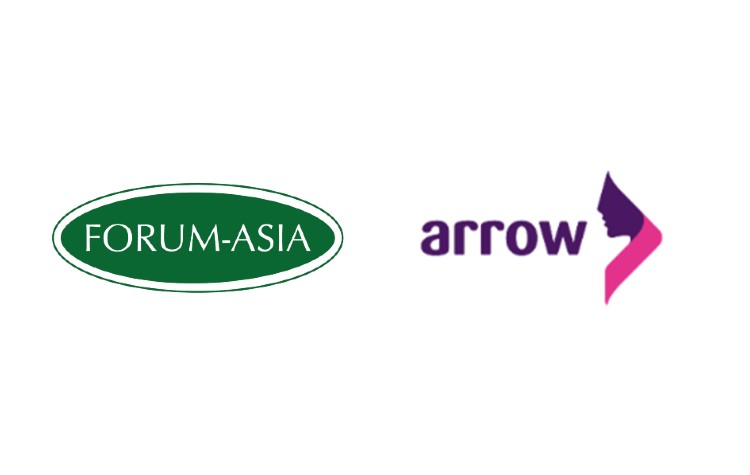
(Bangkok, 16 February 2021) ‒ ‘Freedom of expression and the freedom of information ‒ to speak freely, to participate in public debate, to report the news and to harness digital technology ‒ are rights which are greatly influenced by sex, sexuality and gender,’ panellists said at a webinar on women’s rights and free speech in a digital world held online today.
Organised by the Asian-Pacific Resource and Research Centre for Women (ARROW) and Asian Forum for Human Rights and Development (FORUM-ASIA), the webinar shed light on the situation of freedom of speech and expression in offline and online spaces in the Asian-Pacific region as well as in the Middle East. The panellists were: Rachel Arinii, Programme Manager, FORUM-ASIA; Wai Wai Nu, Executive Director, Women and Peace Network; Bernice Lata, Legal Rights Officer, Fiji Women’s Rights Movement; and Nana Abuelsoud, Researcher, Egyptian Initiative for Personal Rights and closing remarks were made by Judit Arenas, Senior Adviser to the UN Special Rapporteur on the Promotion and Protection of Freedom of Opinion and Expression.
Access to information contributes to overcoming gender inequality and traditional constraints that have historically kept women disempowered and disenfranchised. While digital spaces bring new opportunities, they also create new forms of threats and violence that have a disproportionate impact on women. Globally, it is estimated that women were 27 times more likely to be harassed online.
The webinar underscored the importance of information provision in empowering communities to hold duty-bearers accountable on issues of gender, sex and sexuality. ‘Tackling oppression and freedom of speech can start with provision of information on affirmative sexuality. Provision of information helps women and LGBTIQ to understand and exercise their rights; make informed decisions with regard to their own health and bodies; hold governments to account and challenge injustice, discrimination, and oppression; and participate in the decision-making that affect their lives,’ said Rachel Arinii.
The webinar also highlighted the impact of hate speech on vulnerable communities including Rohingya women and explored feminist approaches on the use of technology, media, data and social media and its impact on women’s freedom of expression. ‘Many women, particularly human rights defenders, activists and journalists who speak out about the rights of minorities, and in particular the Rohingya, continue to be targets of hate speech and branded as “race traitors”. Gender dynamics that underpin the grave crimes committed against Rohingya must never be overlooked and treated equally under international law,’ said Wai Wai Nu.
Another key area emphasised was the call for increased surveillance of women and young people’s freedom of speech by the authorities. In Egypt, several lawmakers and politicians have called for increased online surveillance to prevent young people, especially women, from misusing some apps to undermine public morals and breaching social norms. Panellist Nana Abuelsoud shared that women from low-income backgrounds in Egypt were sent to jail under the guise of ‘Egyptian Family Values’ when they began to document their lives through the use of lip-sync apps.
‘The intersections of the right to free speech, gender, sex and sexuality have been little explored, though they are experienced everyday by women, young people and marginalised groups such as migrant, refugees and LGBT persons. It is worthwhile to understand the nuances of how individual and community expressions continue to be challenged and curtailed, halting progress on public support for equality and rights,’ according to Sivananthi Thanenthiran, Executive Director of ARROW.
The webinar today is a reflection of ARROW’s latest journal, ARROW for Change: The Right to Freedom of Speech and Expression, a volume of articles on women’s rights in a digital age written by prominent human rights activists and defenders.
About the organisers:
The Asian Forum for Human Rights and Development (FORUM-ASIA) is a Bangkok-based regional network of 81 member organisations across 21 Asian countries, with consultative status with the United Nations Economic and Social Council, and consultative relationship with the ASEAN Intergovernmental Commission on Human Rights. Founded in 1991, FORUM-ASIA works to strengthen movements for human rights and sustainable development through research, advocacy, capacity-development and solidarity actions in Asia and beyond. It has sub-regional offices in Geneva, Jakarta, and Kathmandu. www.forum-asia.org
The Asian-Pacific Resource& Research Center for Women (ARROW) is a regional non-profit women’s NGO based in Kuala Lumpur, Malaysia, and has consultative status with the Economic and Social Council of the United Nations. Since it was established in 1993, it has been working to advance women’s health, affirmative sexuality and rights, and empower women through information and knowledge, engagement, advocacy and mobilisation. www.arrow.org.my
For further information, please contact:
East Asia and ASEAN Programme, FORUM-ASIA, [email protected]
For media inquiries, please contact:
Melissa Ananthraj, Communication and Media Programme, FORUM-ASIA, [email protected]
***
For a PDF version of this press release, click here




